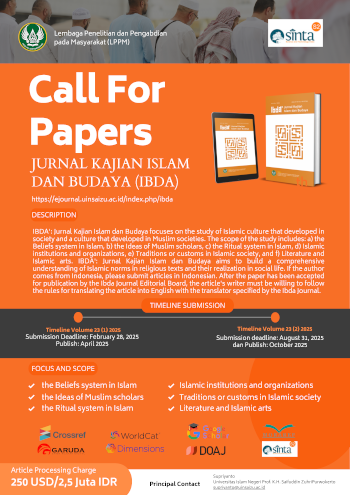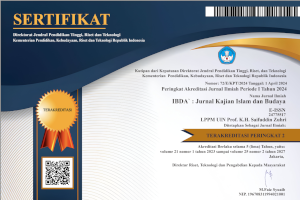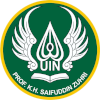Qur'anic Values in Sundanese Culture: A Study of Politeness Principles in Paribasa
DOI:
https://doi.org/10.24090/ibda.v23i1.12736Keywords:
Politeness principle, Sundanese Paribasa, Sundanese Culture, Al-Quran ValuesAbstract
This study investigates the principles of linguistic politeness in the Sundanese language as a reflection of Qur'anic values. The method employs a qualitative approach through content analysis. The research reveals that the politeness principles embedded in Sundanese paribasa align with Qur'anic teachings. These include the concepts of qaulan ma’rufa (good words), qaulan sadida (truthful words), qaulan baligha (effective words), qaulan karima (noble words), qaulan layyina (gentle words), and qaulan maysura (clear words). These principles highlight the significance of respectful communication, consideration for others' feelings, and promoting harmony within social relationships. Consequently, the politeness observed in Sundanese paribasa serves as a manifestation of Qur'anic teachings in daily social interactions. The findings of this research also enhance the understanding of how local religious and cultural values can synergistically contribute to the development of polite and harmonious communication practices. The novelty of this study lies in its integration of linguistic politeness, rooted in cultural values and Qur'anic principles. It serves as a model for fostering ethical and courteous communication in contemporary society.Downloads
References
Aini, N., Djatmika, D., Sumarlam, S., & Kristina, D. (2023). Hedge Markers: A Study of Politeness and Gender in Media Interaction. International Journal of Society, Culture & Language, 11(3), 226-241. https://doi.org/10.22034/ijscl.2023.2002556.3035
Ainissyifa, H., Jamaluddin, D., Farham Hikam, F., & Kusuma Nindyah, I. (2022). Analysis of the Qaulan Concept in the Qur'an as a Communication Model for Educators and Learners. International Journal of Islamic Khazanah, 12(1), 72-85. https://doi.org/10.15575/ijik.v12i1.16610
Akbar, M. H., & Sariyati, I. (2017). Kesantunan dan Ketidaksantunan Berbahasa Masyarakat Sunda dalam Dialog Percakapan pada Acara Kunjungan Keluarga di Beberapa Tempat di Jawa Barat. Al-Tsaqafa: Jurnal Ilmiah Peradaban Islam, 14(1), 89-114. https://doi.org/10.15575/al-tsaqafa.v14i1.1794
Al-Khatib, M. A. (2023). The Concept of Justice in Islam: A Sociopragmatic Analysis. Journal of Ethnic and Cultural Studies, 10(5), 45-66. https://www.jstor.org/stable/48756357
Alwasilah, Y. A. (2024). Politeness Strategy of Prophet Muhammad SAW in the Riyadhus Shalihin Book. JEPAL (Journal of English Pedagogy and Applied Linguistics), 4(2), 111-123. https://doi.org/10.32627/jepal.v4i2.864
Astri, M., Hayati, F., & Hakim, A. (2022). Peran Nilai Budaya Sunda dalam Pola Asuh Orang Tua bagi Penanaman Nilai Moral dan Agama Anak di Kampung Pasirgede Desa Sindangpanon Banjaran. Bandung Conference Series: Early Childhood Teacher Education, 2(2). https://doi.org/10.29313/bcsecte.v2i2.4483
Aziez, S. (2020). The F-Structure of Sundanese Proverbs: A Syntactical Analysis.
Bardon, A., Bonotti, M., Zech, S. T., & Ridge, W. (2023). Disaggregating Civility: Politeness, Public-Mindedness, and Their Connection. British Journal of Political Science, 53(1), 308–325. https://doi.org/10.1017/S000712342100065X
Bogdan, R., & Biklen, S. K. (1997). Qualitative Research for Education (Vol. 368). Allyn & Bacon Boston, MA.
Daar, G. F., Beratha, N. L. S., Suastra, I. M., & Sukarini, N. W. (2023). The Off-Record Politeness Strategy and Cultural Values of the Belis Negotiation Speech Event: A Sociopragmatic Study. Indonesian Journal of Applied Linguistics, 12(3), 626-636. https://doi.org/10.17509/ijal.v12i3.48746
Dahlan, M. (2001). Nilai Al-Quran dalam Memelihara Tutur Kata. Makalah, tidak diterbitkan, 4.
Dortje Leonora Yokbeth, L., Selvianus, S., & Makmur, H. (2024). The Synergy Between Islam and The Local Culture of Maluku, Indonesia. IBDA`: Jurnal Kajian Islam dan Budaya, 22(1), 103-122. https://doi.org/10.24090/ibda.v22i1.8422
Ehineni, T. O. (2019). The Ethnopragmatics of Yoruba Personal Names: Language in the Context of Culture. Studies in African Languages and Cultures(53), 69-90.
Fajrussalam, H., & Hasanah, A. (2018). Core Ethical Values of Character Education Based on Sundanese Culture Value. IJECA (International Journal of Education and Curriculum Application), 1(3), 15-15. https://doi.org/10.31764/ijeca.v1i3.2126
Gupta, M., Dennehy, D., Parra, C. M., Mantymaki, M., & Dwivedi, Y. K. (2023). Fake News Believability: The Effects of Political Beliefs and Espoused Cultural Values. Information & Management, 60(2), 103745. https://doi.org/https://doi.org/10.1016/j.im.2022.103745
Haugh, M., & Chang, W.-L. M. (2019). Indexical and Sequential Properties of Criticisms in Initial Interactions: Implications for Examining (Im) Politeness across Cultures. Russian Journal of Linguistics, 23(4), 904–929. https://doi.org/10.22363/2687-0088-2019-23-4-904-929
Held, G. (2023). A Culture of “Pleasing”? Conceptual Observations on the Development of European “Politeness” Behaviour Between Aesthetics and Ethics. Journal of Historical Pragmatics, 24(1), 49-67. https://doi.org/10.1075/jhp.00065.hel
Huzaeema, F. T., Nurvadi, G. M., Parameswari, L., Basyari, I. W., & Hayati, A. A. (2024). Sundanese Ethnic Mentifact Culture Silih Asih, Silih Asuh, Silih Asah in the Context of Ethnopedagogy. International Journal Of Humanities Education and Social Sciences, 4(1).
Linda Eka, P., Rachmawati, U., Farikah, Delfian, W., Jendriadi, & Ipung, H. (2024). Language Politeness in Elementary School Students Learning Activities. Journal of Language and Literature Studies, 4(1), 61-70. https://doi.org/10.36312/jolls.v4i1.1760
Masruddin, M., Amir, F., Langaji, A., & Rusdiansyah, R. (2023). Conceptualizing Linguistic Politeness in Light of Age. International Journal of Society, Culture & Language, 11(3), 41-55. https://doi.org/10.22034/ijscl.2023.2001556.3018
Mulyana, A., & Darmawan, W. (2013). Value Development in History Learning Through Paribasa and Babasan. Historia: Jurnal Pendidik dan Peneliti Sejarah, 14(1), 35-35. https://doi.org/10.17509/historia.v14i1.1912
Pedersen, J. (2010). The Different Swedish Tack: An Ethnopragmatic Investigation of Swedish Thanking and Related Concepts. Journal of Pragmatics, 42(5), 1258–1265. https://doi.org/10.1016/j.pragma.2009.09.026
Ramli, R., Ibrahim, R., Muthalib, K. A., Alamsyah, T., & Gadeng, A. N. (2023). Principles of Politeness Used and Violated by Acehnese-Speaking Khatibs in Their Friday Prayer Sermons. Studies in English Language and Education, 10(1), 501-516. https://doi.org/10.24815/siele.v10i1.26418
Ratnasari, D., Sidiq, F., & Kalfin. (2023). Someah Culture as a Shaper of Brand Personality in Sundanese Ethnic Society: Implications of Personal Branding and Cultural Transactions. International Journal of Humanities, Law, and Politics, 1(3), 36-39. https://doi.org/10.46336/ijhlp.v1i3.30
Sariah, S., & Nurhadi, J. (2020). Creativity Of Language, Lexical Relations, And Cultural Values: Sundanese Hilarious Puns In Brilio.Net. Humanities & Social Sciences Reviews, 8(3), 1260-1271. https://doi.org/10.18510/hssr.2020.83129
Sauri, S. (2006). Pendidikan Berbahasa Santun. PT Genesindo.
Sudaryat, Y., & Nurhadi, J. (2023). The Value of Local Wisdom is Love for the Environment in Sundanese Idiom. Asian Journal of Social Science and Management Technology, 5(2), 118-124.
Suherman, A. (2018). Nationality Values of Sundanese Words and Proverbs.
Teitelbaum, M., & Ben-Ze’ev, A. (2023). Politeness, Respect, Care, and Bias in Social Interactions. In C. Xie (Ed.), Advancing (Im)politeness Studies: Cultural, Digital and Emotional Aspects (pp. 73-92). Springer International Publishing. https://doi.org/10.1007/978-3-031-37064-9_5
Wijaya, I. S., Tahir, M., Armella, R., & Abdi, A. M. (2023). Implementation of Islamic Communication Principles in High School Counseling Guidance in East Kalimantan. Edukasi Islami: Jurnal Pendidikan Islam, 12(03).
Yin, R. K. (2011).Qualitatif Research From Start to Finish. The Guilford Press.
Zakaria, B. N. A., Fakih, M. N., Saifuddin, S., Imani, A., & Said, H. (2022). Politeness Strategies Employed in Communication with Santri and Ustadz in an Islamic Boarding School in Indonesia. Al-Hijr: Journal of Adulearn, 1(2), 80-87.
Downloads
Published
How to Cite
Issue
Section
License
Copyright (c) 2025 Asep Hidayatullah, Dadang S. Anshori, Andoyo Sastromiharjo

This work is licensed under a Creative Commons Attribution-ShareAlike 4.0 International License.
Authors who publish with this journal agree to the following terms:
- Authors retain copyright and grant the journal right of first publication with the work simultaneously licensed under a Creative Commons Attribution-ShareAlike License a that allows others to share the work with an acknowledgement of the work's authorship and initial publication in this journal.
- Authors are able to enter into separate, additional contractual arrangements for the non-exclusive distribution of the journal's published version of the work (e.g., post it to an institutional repository or publish it in a book), with an acknowledgment of its initial publication in this journal.
- Authors are permitted and encouraged to post their work online (e.g., in institutional repositories or on their website) before and during the submission process, as it can lead to productive exchanges, as well as earlier and greater citation of published work (See The Effect of Open Access).
















